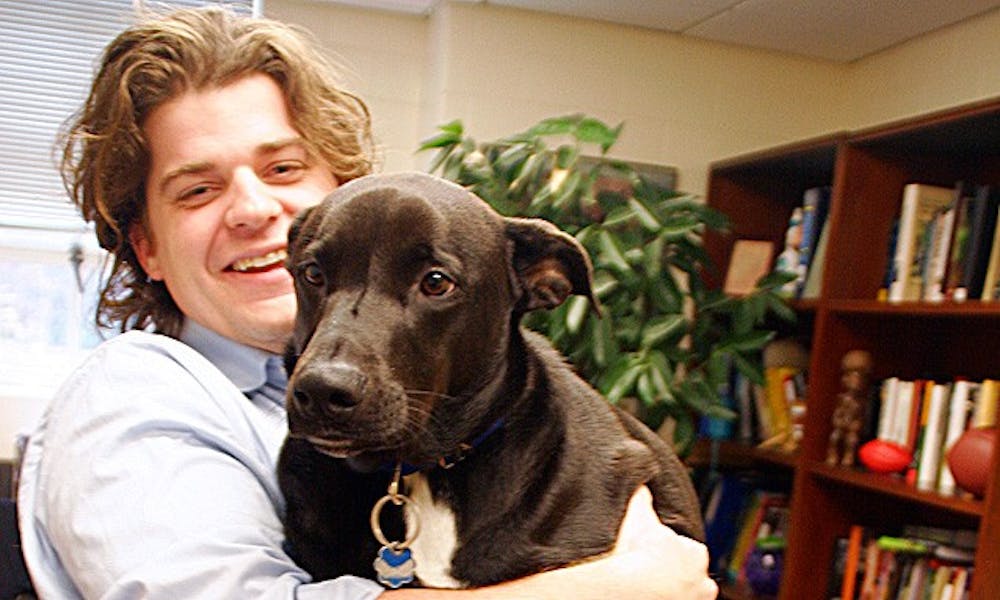Brian Hare, an assistant professor of evolutionary anthropology, is the director of the Duke Canine Cognition Center, which tests dogs brought in voluntarily by their owners in order to understand more about the cognitive abilities of dogs. The Chronicle’s Maggie Spini spoke with Hare about the center, which has been open since last Fall and hopes to come up with ways to train dogs to become even better at helping people.
The Chronicle: What are your long-term hopes for the Duke Canine Cognition Center?
Brian Hare: What we’d really, really love to see is some of the things that we learn here at the Duke Canine Cognition Center be applicable to real-world problems. Either helping people teach dogs to be better at finding bombs, or to be better companion animals to, say, children with autism or helping people with disabilities. The medical community is also getting more and more excited about using dogs in different ways to help people. There’s a huge supply problem—there are not many dogs available, and it’s very labor-intensive to train these dogs to help people. So, if we could understand dog psychology, we might make the whole process easier and there would be more dogs that are better at helping people.
TC: Can you tell me more about what you were studying around the time the center opened?
BH: We were studying trust. For example, how is it that dogs form a trusting bond with a new person? It’s very interesting to know how social creatures form bonds with one another because that’s a very important thing that social animals do. A lot of developmental disorders in people may be related to problems in forming bonds with people. From a scientific perspective, dogs are a really interesting model of social bonding. Specifically, social bonding is important with dogs because if you’re a dog, one of the big challenges you have, particularly if you’re a shelter dog or a working dog, is having to learn to trust new people, because you’re going to have a new handler or a new owner.... Further, if they form a trusting relationship with a stranger, does that trust generalize to lots of contexts, or is it when they form a trusting relationship in one context, is it only in that context that they trust someone?
TC: Have you started any new tests on the dogs since the opening?
BH: We’re also very interested in how dogs navigate.... There hasn’t been much research on how dogs navigate.... What are the predictable errors that dogs make when they navigate, and are there strategies we can then give people to better use dogs when they’re helping people?
TC: What has been the most exciting aspect of this research?
BH: Even though people have been studying animal psychology for over 100 years, we still know almost nothing about dog psychology because dogs were not seen as being a useful model for behavioral studies. Actually, I think that’s the exciting thing—people are getting excited about learning about dogs, and we’re going to learn a lot about them.
TC: About how many dogs have participated in the study?
BH: We have over 1,000 people signed up to volunteer their dogs in the local area. Many of them are in the Duke community—we’re very thankful because these people are volunteering their time. So far, I think we’re approaching something like 500 or 600 dogs.
TC: You have said previously that you thought your biggest challenge would be dealing with dogs’ anxious owners. Has that, in fact, been a problem?
BH: [Laughs] Well, it is true that people become very emotionally involved in their dog’s performance. People have been wonderful, and we just try to help them understand that when we have a dog come and play a game in our little center, it’s just a game. Just because you’re bad at playing baseball doesn’t mean that you’re not a wonderful football player. We just try to explain to people that your dog may not have done well in this, but that doesn’t mean they’re not going to do well in other things.
TC: Can those in the Duke community get involved?
BH: Undergraduates who are interested should contact the Duke Canine Cognition Center. We always need more help. The center is here for undergraduates—this is a place where we want people who are interested in behavior or dogs to have the opportunity to get their hands involved in some real research.... Dog lovers—and cat lovers, too—are allowed.
Get The Chronicle straight to your inbox
Signup for our weekly newsletter. Cancel at any time.

